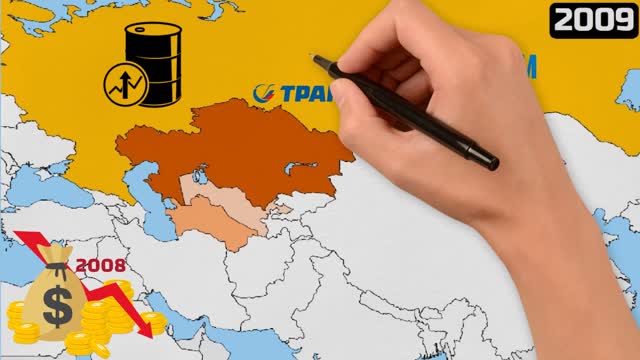Premium Only Content

Why Russia lost influence in Central Asia to China
Why Russia lost influence in Central Asia to China
Hello friends. Central Asia consists of 5 countries: Kazakhstan, Kyrgyzstan, Tajikistan, Turkmenistan and Uzbekistan. They have a total population of about 70 million people, with extremely abundant resources. Although they became independent after the breakup of the Soviet Union, these countries remained under Russia's close influence, economically and politically.
However, since the involvement of China, Russia's unique position has disappeared. Even they have gradually lost control of Central Asia to Beijing. Why is that? Let's find out together! In 1991-2000, Central Asian countries were generally still under Russian control.
Economically, Moscow has a near monopoly on crude oil and gas imports from three countries: Kazakhstan, Uzbekistan and Turkmenistan. They are like a merchant, importing at a low price and exporting at a high price, to make a profit. The other two countries, Kyrgyzstan and Tajikistan, have fewer resources. The people are mainly engaged in agriculture. Their main source of income comes from labor export to Russia.
Economic dependence creates political pressure. Every decision of the leaders of Central Asia must take into account the attitude of Russia. In terms of military, 4/5 countries became members of the Collective Security Treaty - CSTO. Under the leadership and protection of Moscow. Remaining Turkmenistan, this country has its own armed forces, but is not independent.
They had to share common command with the Russian generals. Entering the next decade, everything changed, as China jumped into the game. Specifically, in 2005, Kazakhstan agreed to Beijing to build the first oil pipeline, connecting from Atasu to Xinjiang. As a result, they have more energy exports, and avoid being completely dependent on Russia. .
Realizing the positive situation, other Central Asian countries followed suit, calling for investment from China. However, the Beijing side is afraid to collide with Russia, so it is still considering. It was not until 4 years later that the opportunity opened up for them. The 2008 global economic crisis caused oil and gas prices to plummet.
Large Russian corporations, such as Gazprom, Transneft and Rosneft, are having financial difficulties and finding energy export markets. At that moment, the gas pipeline from Turkmenistan, which has about 9.4% of global reserves, blew up. Causing exports to Russia to be interrupted.
The two sides argued, blaming each other for the cause of the incident, leading to tension. In the meantime, the Russian company, in particular Gazprom, asked to renegotiate the contract: reduce the purchase price and quantity of gas, imported from Turkmenistan, due to the gloomy market. The two sides have shown that they no longer want to do business with each other.
-
 LIVE
LIVE
Sean Unpaved
1 hour agoRyne Sandberg's Legacy, Madden's 99 Club, NIL's Locker Room Heat, & Wilkins' Kiss-and-Run
149 watching -
 1:04:05
1:04:05
Timcast
1 hour agoThe TAMURA Conspiracy, Theory Says Blackstone WAS The Target Over Israel, NOT NFL
46K39 -
 2:15:27
2:15:27
Steven Crowder
4 hours ago🔴 NYC Shooting Exposes Massive Hypocrisy From Mamdani & the Left
215K230 -
 LIVE
LIVE
The Mel K Show
2 hours agoMORNINGS WITH MEL K - An Engaged Fed Up Citizenry is Finally Moving the Needle Towards Accountability 7-29-25
1,395 watching -
 LIVE
LIVE
Rebel News
50 minutes agoByelection ballot drama, Ford flips on jobs for asylum seekers, Pipeline problems | Rebel Roundup
263 watching -
 LIVE
LIVE
The Tom Renz Show
49 minutes agoThe Manhattan Shooting, Vax Accountability, & Trump's Trade Deals In Crypto World
135 watching -
 LIVE
LIVE
TheAlecLaceShow
1 hour agoGuest: George Papadopoulos | NYC Shooting In A Gun Free Zone | The Alec Lace Show
65 watching -
 LIVE
LIVE
LFA TV
15 hours agoLFA TV ALL DAY STREAM - TUESDAY 7/29/25
3,960 watching -
 1:10:32
1:10:32
The Rubin Report
2 hours agoMidtown Tower Shooting Causes Resurfaced Bill Maher Clip to Go Viral
40.9K61 -
 2:42:17
2:42:17
Tucker Carlson
1 day agoRichard Werner Exposes the Evils of the Fed & the Link Between Banking, War, and the CIA
69.8K137